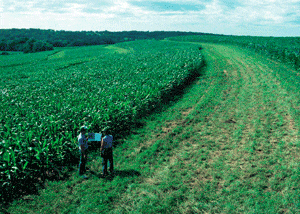Comments Due March 4
 |
Organic and Non-GMO agriculture has shouldered the burden of GMO contamination for too long. This is our opportunity to tell the USDA that it must use its authority to:
1. Implement mandatory contamination prevention measures to avoid the problem and protect the organic and non-GMO sector;
2. Ensure shared responsibility for the unwanted spread of genetically engineered (GE) products, including a fair compensation mechanism that does not further burden those who avoid, and sometimes are harmed by, contamination.
The USDA published a request for public comments last November (FR Vol. 78, No. 213, Nov. 4, 2013) on how agricultural “coexistence” in the United States can be strengthened. The deadline for comments is March 4, 2014.
Comment online at Regulations.gov Docket No. APHIS-2013-0047 (click here for the comment page and here for the background documents).
You can also send comments via postal mail (postmarked by March 4) to: Docket No. APHIS-2013-0047, Regulatory Analysis and Development, PPD, APHIS, Station, 3A-03.8, 4700 River Road Unit 118, Riverdale, MD 20737-1238.
Please submit your comments right away! This issue is extremely important.
The USDA is asking for public input on more than a dozen questions under the topics of education, collaboration and outreach for coexistence. View the questions here.
The department seeks input on coexistence practices and, specifically, how the department can support communication between farmers. Yet true coexistence is impossible! By focusing on “coexistence” the USDA is skirting the most important question at hand:
How can contamination be prevented? Communication between neighboring farmers is a good thing, but communication alone is not a viable solution to the complicated contamination issues at hand. Likewise, the burden should not be on farmers to “talk it out”. The burden of contamination issues should be placed on the manufacturers of GMO seed technology and on the federal government that is mandated to regulate that industry.
Sample Letter: You can use the language in the letter below (although we encourage you to customize it a bit.) Taking the time to formulate your own comments carries the most weight.
RE: Comment on Enhancing Agricultural Coexistence (Docket No. APHIS-2013-0047)
To Whom It May Concern:
Thank you for the opportunity to provide public input on Enhancing Agricultural Coexistence. Although it would be nice if all sectors of agriculture could ”coexist,” there are some substantive issues that prevent that from happening, particularly with regards to genetic contamination and who is responsible for compensation in the event of contamination.
The USDA seeks input on questions of education and outreach, but that is surely putting the cart before the horse. You cannot educate when you do not have a clear message around the issues brought up in the AC21 document: (1) compensation, (2) stewardship, (3) education and outreach, (4) research and (5) seed quality. You must establish clear guidelines around these issues before you begin to “educate, collaborate, and conduct outreach.” Voluntary solutions on these issues are insufficient; that is what we have today and it is clearly not working.
Specifically, I ask that the USDA:
- Establish mandatory measures to prevent contamination. The USDA must use its authority to prevent GMO contamination and to compensate contaminated farms and other businesses impacted. The USDA must establish a set of mandated best practices to prevent GE contamination by all farmers who use GE seed and require these farmers and manufacturers to institute concrete contamination prevention measures on their farms to supplement those already being used by organic and other non-GMO producers.
- Establish shared responsibility. Those who own and grow GMOs are currently not required to prevent contamination in the field and marketplace. Farmers who avoid GMOs continue to shoulder the entire burden of contamination prevention and clean-up, and at times give up growing certain crops. Planting GMOs must not in any way preclude the growing of organic or other non-GMO crops.
- Conduct more research to ensure a non-GMO seed supply. If the USDA is going to educate the agricultural community, it should learn more about the impacts of GE products and monitor contamination in the seed supply. The USDA should immediately create a GE contamination registry so it can track and eliminate known sources of GE contamination across the supply chain.
- Reject AC21’s compensation proposal. AC21 recommends that farmers buy crop insurance to protect themselves against unwanted GMO contamination. This is simply unacceptable. It would unfairly require organic and other non-GMO producers to spend even more money to protect themselves while GMO manufacturers would completely escape liability for GMO contamination prevention and compensation. The patent holders of GMO products should be responsible for segregation and traceability, from seed to plate. Those who own, promote and profit from GMO products should be held financially responsible for the economic and market harm their products cause.
Background
In 2011, the USDA reconvened the Advisory Committee on Biotechnology and 21st Century Agriculture (AC21) following its highly controversial approval of genetically engineered alfalfa. AC21 members were charged with providing recommendations on the idea of “coexistence,” including an appropriate compensation mechanism for dealing with economic harm caused by GE contamination.
Last year AC21 members provided USDA Secretary Vilsack with their final recommendations in the areas of (1) compensation, (2) stewardship, (3) education and outreach, (4) research, and (5) seed quality. A public comment period is now open to solicit feedback on these recommendations.
Again, comment online at Regulations.gov Docket No. APHIS-2013-0047
Thanks to the Organic Seed Alliance for much of the material used in this Action Alert. For more background please visit the Organic Seed Alliance website at http://www.seedalliance.org.

